Intricate art of picking a captain
By A.C. De Silva
Picking a captain has been somewhat of a problem to teams. A captain
needs to have the basic talent to justify him occupying a valuable place
in the team.
The game of cricket has now turned out to be a hard-pressed affair
that a captain must have the talent to go with ability to inspire. Yet
before a skipper is chosen, it is important to define what is meant by
'being worth a place in the side.' It must be remembered that a good
leader of men can contribute something to the side. A great bowler or
batsman may have the potential to destroy opponents, but shrewd
captaincy can have the same effect. At the highest echelons of the game,
the requirements are more stringent.
|
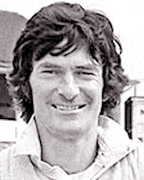
Alan Knott – his observations from behind the stumps,
provided valuable tips to a skipper. He helped skipper
Illingworth a great deal. |
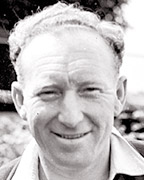
Stuart Surridge – was at the helm when Surrey was at helm
when Surrey had a dream run with seven Championships in
1950’s. |
Take the case of one-time England captain Ray Illingworth in 1969
when the selectors used the traditional Australian method those days of
picking the leader. They chose what they considered to be the best
eleven players in the country, and appointed Ray Illingworth as the
captain of the group. That is the best policy when there is no
outstanding leader in the country.
The path to success is made smoother if the captain has done some
bowling. It does not mean the picked person should bowl, I mean about a
1,000 overs a summer, but it is invaluable if he knows from experience
the problems a bowler can suffer.
Additional ability
The case of Ray Illingworth was undoubtedly aided by the fact that he
was a bowler. He was able to recognise the trials and tribulations his
bowlers were going through, and tried to help them with advice and
encouragement.
Since Illingworth was a bowler who bowled on different wickets in
varying circumstances, he was able to read his bowlers' minds. That was
to help.
|
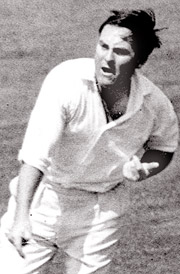
Ray Illingworth – Assumed England captaincy in 1969
consulted wicket-keeper Alan Knott and got valuable advice.
|
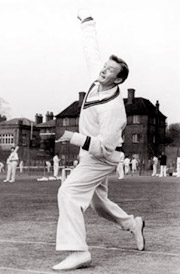
Richie Benaud – Great allrounder and a great captain.
|
There is little a captain can do when his side is batting. He is not
totally helpless - it is essential he talks to a batsman before he goes
in to bat - but he has no influence once his men are at the crease.
Contrast, you in control of your team's destiny when in the field.
Bowlers can, and should be helped all the time.
Having a specialist batsman, especially an opener, as captain can
bring problems. Through no fault of their own batsmen as a breed have
little understanding of bowlers. Most seem to believe that bowling is
relatively simple and do not realise the mental effect a dropped catch
or a slack piece of fielding can have.
Batsmen's eternal search for runs can also get on top of them.
Illingworth says that he finds it telling that international captains
like himself, Richie Benaud, Gary Sobers and Tony Greig were all-rounders.
The common understanding was that they understood both bowlers and
batsmen, which made it easier for them to lead the side effectively.
The right management
A person who bats in the middle order and plays a supporting role as
a bowler-proof of his versatility - makes the best captain.
And of all the great captains who have emerged from the all-rounders
category none has been greater that Richie Benaud. He won the Ashes in
1961 on his only tour of England as captain. That is testament enough to
his ability, because Australia was the underdog against an England side
that had a good depth of batting, a potent bowling attack spearheaded by
Fred Trueman and Brian Statham.
Illingworth says his first knowledge of Benaud being able to coax the
best out of his players is restricted to six weeks playing under him for
a commonwealth team that toured South Africa in 1961. The relentless
march of time since then has done nothing to dim the immense respect he
had on Illingworth.
|

Tony Greig – another good allrounder.
|
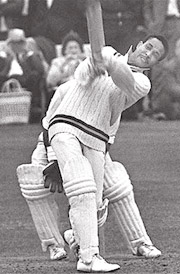
Gary Sobers – A fine allrounder and understood both bowlers
and batsmen. |
Illingworth says that he is convinced that he would have been a 20
per cent better bowler if Benaud had captained him (Illingworth)
regularly and knew the mentality of bowlers who can be pessimistic and
lack a little confidence.
A specialist bowler can suffer from being saddled with the
responsibilities of leadership like the opening batsmen he can worry
about his personal contribution. There is also the danger that if the
wickets are good, he can be accused of under-bowling himself, and if he
clears up the tail-enders he leaves himself open to petty claims that he
is using his position as captain to capture easy wickets.
Mr. Confidence
If a bowler is to be captain he must have a strong character-like
Stuart Surridge, who was at the helm when Surrey began its run of seven
successive championships in the 1950's.
Ray Illingworth says that he made it a point of consulting - the
wicket-keeper Alan Knott when he (Illingworth) captained England.
Knott was alert, read the game well, and was eager to help. Knott
could see more from behind the stumps than Illingworth from his position
of gully, and Knott gave invaluable information which he used in
planning bowling changes and tactical switches.
The appointment of a captain is not something to be taken lightly.
Decisions are easy to make hard to undo. You are considering cricket's
equivalent of a marriage between a man and a team, so the old saying
'Many in haste, repent at leisure', is particular pertinent. |


